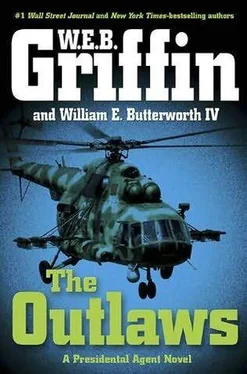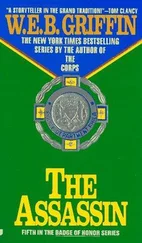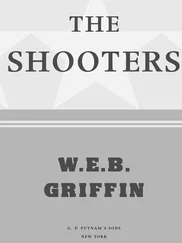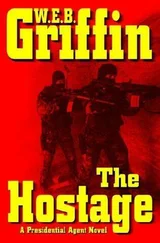W Griffin - The outlaws
Здесь есть возможность читать онлайн «W Griffin - The outlaws» весь текст электронной книги совершенно бесплатно (целиком полную версию без сокращений). В некоторых случаях можно слушать аудио, скачать через торрент в формате fb2 и присутствует краткое содержание. Жанр: Триллер, на английском языке. Описание произведения, (предисловие) а так же отзывы посетителей доступны на портале библиотеки ЛибКат.
- Название:The outlaws
- Автор:
- Жанр:
- Год:неизвестен
- ISBN:нет данных
- Рейтинг книги:3 / 5. Голосов: 1
-
Избранное:Добавить в избранное
- Отзывы:
-
Ваша оценка:
- 60
- 1
- 2
- 3
- 4
- 5
The outlaws: краткое содержание, описание и аннотация
Предлагаем к чтению аннотацию, описание, краткое содержание или предисловие (зависит от того, что написал сам автор книги «The outlaws»). Если вы не нашли необходимую информацию о книге — напишите в комментариях, мы постараемся отыскать её.
The outlaws — читать онлайн бесплатно полную книгу (весь текст) целиком
Ниже представлен текст книги, разбитый по страницам. Система сохранения места последней прочитанной страницы, позволяет с удобством читать онлайн бесплатно книгу «The outlaws», без необходимости каждый раз заново искать на чём Вы остановились. Поставьте закладку, и сможете в любой момент перейти на страницу, на которой закончили чтение.
Интервал:
Закладка:
This was because Laboratory Four was deep underground, beneath Hangar III, one of a row of enormous hangars each bearing the AFC logotype. It was also below Laboratories One, Two, and Three, which were closer to ground level as their numbers suggested, One being immediately beneath the hangar.
When Aloysius Francis Casey, AFC's chairman, had been a student at MIT, he had become friendly with a Korean-American student of architecture, who was something of an outcast because of his odd notion that with some exceptions-aircraft hangars being one-all industrial buildings, which would include laboratories, should be underground.
This had gotten J. Charles Who in as much trouble with the architectural faculty as had Casey's odd notions of data transmission and encryption had done the opposite of endearing him to the electrical engineering and mathematics faculties.
Years later, when Casey decided that he had had quite enough, thank you, of the politicians and weather of his native Massachusetts to last a lifetime, and wanted to move at least the laboratories and some of the manufacturing facilities elsewhere, he got in touch with his old school chum and sought his expertise.
Site selection was Problem One. Las Vegas had quickly risen to the head of the list of possibilities for a number of reasons including location, tax concessions to be granted by the state and local governments for bringing a laboratory/ production facility with several thousand extremely well-paid and well-educated workers to Sin City, and the attractions of Sin City itself.
At Who's suggestion, just about everything would go to Vegas.
Charley Who, Ph.D. (MIT), AIA, had pointed out to Aloysius Casey, Ph.D. (MIT), that all work and no play would tend to make his extremely well-paid workers dull. It was hard to become bored in Las Vegas, whether one's interests lay in the cultural or the carnal, or a combination of both.
Construction had begun immediately and in earnest, starting with the laboratories that would be under Hangar III. They were something like the BioLabs at Fort Detrick in that they were as "pure" as they could be made. The air and water was filtered as it entered and was discharged. The humidity and temperature in the labs was whatever the particular labs required, and being below ground cut the cost of doing this to a tiny fraction of what it would have cost in a surface building. They were essentially soundproof. And, finally, the deeper underground that they were, the less they were affected by vibration, say a heavy truck driving by or the landing of a heavy airplane. Almost all of Aloysius's gadgets in development were very tiny and quite delicate. Much of the work on them was done using microscopes or their electronic equivalent. Vibration was the enemy.
What Casey was working on now in Laboratory Four, his personal lab-"My latest gadget," as he put it-was yet another improvement on a system he had developed for the gambling cops, or as they liked to portray themselves, "The security element of the gaming industry."
Many people try to cheat the casinos. Most are incredibly stupid. But a small number are the exact opposite: incredibly smart, imaginative, and resourceful. Both stupid and near-genius would-be thieves alike have to deal with the same problem: One has to be physically in a casino if one is to steal anything.
Surveillance cameras scan every inch of a casino floor, often from several angles, and the angles can be changed. The people watching these monitors know what to look for. If some dummy is seen stealing quarters from Grandma's bucket on a slot machine row, or some near-genius is engaged with three or more equally intelligent co-conspirators in a complex scheme to cheat the casino at a twenty-one table, they are seen. Security officers are sent to the slot machine or the twenty-one table. The would-be thieves and cheats are taken to an area where they are photographed, fingerprinted, counseled regarding the punishments involved for cheating a casino, and then shown the door.
The problem then becomes that stupid and near-genius alike tend to believe that if at first you don't succeed, one should try, try again. They come back, now disguised with a phony mustache or a wig and a change of clothing.
Specially trained security officers, who regularly review the photographs of caught crooks, stand at casino doors and roam the floors looking for familiar, if unwelcome, faces.
When Casey had first moved to Las Vegas, he had been very discreetly approached-the day he was welcomed into the Las Vegas Chamber of Gaming, Hospitality and Other Commerce-by a man who then owned three-and now owned five-of the more glitzy hotel/casinos in Sin City.
The man approached Casey at the urinal in the men's room of the Via Veneto Restaurant in Caligula's Palace Resort and Casino and said he wanted to thank him for what he was doing for the "boys in the stockade in Bragg."
"I don't know who or what the hell you're talking about," Casey had replied immediately.
But Casey of course knew full well who the boys in the stockade in Fort Bragg were-Delta Force; their base had once been the post stockade-and what he was doing for them-providing them with whatever they asked for, absolutely free of charge, or didn't ask for but got anyway because Casey thought it might be useful.
"Sure you do," the man had said. "The commo gear. It was very useful last week in Tunisia."
"How the hell did you find out about that?" Casey had blurted.
"We have sources all over."
"Who's 'we'?"
"Like you, people who happen to be in positions where we can help the good guys, and try quietly-very quietly-to do so. I'd like to talk to you about our group some time."
"These people have names?"
They were furnished.
"Give me a day or two to check these people out," Casey said, "then come to see me."
The first person Casey had tried to call was then-Major General Bruce J. McNab, who at the time commanded the Special Forces Center at Fort Bragg. He got instead then-Major Charley Castillo on the phone. Castillo did odd jobs for McNab-both had told Casey that-and he'd become one of Casey's favorite people since they'd first met.
And when Casey had asked, Castillo had flatly-almost indignantly-denied telling anyone about the Tunisian radios mentioned in the casino pisser and of ever even hearing of the man who claimed to own the glitzy Las Vegas hotels.
General McNab, however, when he came on the line, was so obfuscatory about both questions-even aware that the line was encrypted-that Casey promptly decided (a) McNab knew the guy who owned the three glitzy casinos; (b) had told the guy where the radios used in Tunisia had come from; (c) had more than likely suggested he could probably wheedle some out of Casey, which meant he knew and approved of what the guy was up to; and, thus, (d) didn't want Castillo to know about (a) through (c).
That had been surprising. For years, from the time during the First Desert War, when then-Second Lieutenant Castillo had gone to work for then-Colonel McNab, Casey had thought-In fact I was told-that Castillo was always privy to all of McNab's secrets.
Casey prided himself on his few friends, and on having no secrets from them. He had quickly solved the problem here by concluding that having no secrets did not mean you had to tell your friends everything you knew, but rather, if asked, to be wholly forthcoming.
If Castillo asked about these people in Las Vegas, he would tell him. If he didn't ask, he would not.
And, as quickly, he had decided if these people were okay in General McNab's book, they were okay-period.
Unless of course something happened that changed that.
Casey had called the man who owned the three glitzy hotels-and was in business discussions leading to the construction of the largest hotel in the world (7,550 rooms)-and told him he was in.
Читать дальшеИнтервал:
Закладка:
Похожие книги на «The outlaws»
Представляем Вашему вниманию похожие книги на «The outlaws» списком для выбора. Мы отобрали схожую по названию и смыслу литературу в надежде предоставить читателям больше вариантов отыскать новые, интересные, ещё непрочитанные произведения.
Обсуждение, отзывы о книге «The outlaws» и просто собственные мнения читателей. Оставьте ваши комментарии, напишите, что Вы думаете о произведении, его смысле или главных героях. Укажите что конкретно понравилось, а что нет, и почему Вы так считаете.











